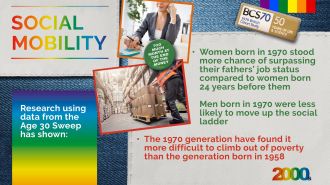
- Our studies
- Our research
- Publications and resources
- Data access and training
- About
- News
- Events
- Get in touch
- Join our mailing list

Welcome to our news and blogs section. Here you’ll find the latest developments and insights from across our longitudinal studies.
Young people from more deprived neighbourhoods have to wait up to 15 minutes longer for accident and emergency (A&E) treatment than their more advantaged peers with similar healthcare needs, according to new findings from Next Steps.

People who remain members of clubs and societies throughout their lives tend to have a higher daily step count and exercise more in their mid-40s.

Men are 34% more likely than women to be employed in top jobs at age 42 with overconfidence explaining up to 11% of the gender gap, on average, for full-time workers.

Inequalities in the early cognitive, social and emotional development of children in the UK, which are so important in shaping later life outcomes, have changed little between those born in the early 2000s and those born in the early 2010s. Researchers from the UCL Centre for Longitudinal Studies (CLS) and the Institute for Fiscal Studies […]

More than one in three British adults are suffering from two or more chronic health conditions in middle age, such as recurrent back problems, mental ill-health, high blood pressure, diabetes, and high-risk drinking, according to UCL researchers.

Children with severe conduct and hyperactivity problems at school entrance tend to gain lower scores in vocabulary tests during adolescence, according to a new study.

During the Age 42 Sweep, study participants were asked to repeat a vocabulary assessment they had previously taken in 1986, at age 16.

Celebrating 50 years of the 1970 British Cohort Study – BCS70 has been one of the leading sources of evidence on social mobility, informing a series of impassioned academic debates on this topic.

Research using data from the 1970 British Cohort Study (BCS70) has revealed how reading for pleasure can help children excel in English and maths. It has also shown that good reading habits in childhood have a significant longer term impact on people’s vocabulary, with the benefits being evident even 30 years later.

Celebrating 50 years of the 1970 British Cohort Study – Cohort members who had often read for pleasure made more progress in English, but also in maths, between the ages of 10 and 16, compared to those who had rarely read.

Celebrating 50 years of the 1970 British Cohort Study – During the Age 16 Sweep study members were given a 4-day dietary diary to complete. Analysed alongside dietary data from later sweeps, this information may help us to understand adult eating patterns, and health outcomes such as obesity and diabetes.

Members of Generation X who lived in Britain’s declining industrial heartlands in the 1980s were more likely to play truant during their school years and to be involved in crime as adults, compared to those who grew up in more advantaged areas.
In honour of the 50th anniversary of the 1970 British Cohort Study, this scientific conference will showcase the latest cutting-edge research using CLS cohort data.
Ryan Bradshaw
Senior Communications Officer
Phone: 020 7612 6516
Email: r.bradshaw@ucl.ac.uk